#japanese n4
Explore tagged Tumblr posts
Text
にくい - Difficult to, Hard to
Verb in noun form[ます]+ にくい Polite: Verb in noun form[ます]+ にくい + です
Like 易い (やすい), にくい is an い-Adjective that is regularly attached to the ます stem of verbs, communicating the difficulty of performing the verb that precedes it. In other words, the verb, aka whatever is difficult to do, will always come before にくい.
The nuance of にくい is that a task is difficult to do because of the required skill level or similar factors.
私には英語の「Literally」という単語がとても言いにくい。For me, the English word ‘literally’ is very hard to say. (Hard due to the individual's skill level)
アフリカには行きにくいです。It is hard to go to Africa.
This is different from づらい, which focuses more on a task that is difficult due to being unbearable/hard to endure for some other reason (such as emotional). For example:
お前には本当に言いづらいけど、お前のギターを壊した。ごめん。This is very difficult for me to say to you, but I broke your guitar. I'm sorry. (Hard because the speaker knows that telling the listener will cause a negative response)
#japanese#learn japanese#japanese studyblr#how to learn japanese#studyblr#learning japanese#hiragana#japanese beginner#japanese langblr#japanese for beginners#N4#n4 grammar#japanese n4#japanese lesson#japanese grammar#learn how to speak japanese
85 notes
·
View notes
Text
The 6 Differences Between は and が
DIFFERENCE 1
The important fact is AFTER は
• この犬は私のぺットです。This dog is my pet.
You want to emphasize that this is not a stray dog. It is not someone else's pet dog. It is MY PET. So anything comes after は is the main part you want the listener to pay attention to.
The important fact is BEFORE が
• この犬が私のベットです。This dog is my pet.
You want to emphasize that THIS IS THE DOG that is my pet. Not other dogs. Imagine you're at a park and there are 3, 4 other dogs playing together with your dog and you want to tell your friend that THIS DOG is the one that is your pet dog, other dogs are not yours. So, what comes before が is the main part you want to tell the listener.
More examples:
• このケーキはおいしいです。This cake is DELICIOUS! (You want to tell your friend that this cake is indeed very good. Your emphasis falls on おいしい, so you use は, because the important fact is AFTER は.
• このケーキがおいしいです。THIS CAKE is delicious. (You want to tell your friend that among all the cakes on the buffet table, this particular cake you are pointing to is the most delicious one. Others are not good.) Your emphasis falls on このケーキ (THIS CAKE), so you use が, because the important fact is BEFORE が.
DIFFERENCE 2
New information and things that you mention for the first time, use が. Old information or topics that have been mentioned earlier but is now repeated again, use は.
• 学校にマイクという男がいます。There is boy named Mike in my school.
You started the conversation with your friend by saying there's a new student named Mike in the school. That is the first time you mentioned Mike. It is new information, therefore use が.
• マイクはアメリカ出身です。Mike is from America.
You mention Mike the 2nd time now and it is no longer a new information. It is considered old information, therefore use は.
DIFFERENCE 3
Stating facts without adding your personal opinion or judgment use が. By adding your own opinion or judgment, use は.
• 外に猫がいます。There is a cat outside.
You are just merely stating a fact that there is a cat outside. This sentence doesn't include your description about the cat. No personal opinion or judgment about the cat.
• あの猫は白いです。The cat is white in colour.
You are putting your description, your judgment into the sentence about the cat. When you are adding your own thoughts, opinion, description about something, use は.
• 日本の料理はおいしいです。Japanese food is tasty.
You are putting your opinion/judgment about Japanese food in your sentence, therefore, use は.
DIFFERENCE 4
When you make comparison, use は. When you eliminate other options, use が.
• お茶は好きですが、コーヒーは好きじゃありません。I like tea but I don't like coffee.
DIFFERENCE 5
If two actions are done by the same person, use は. If two actions are done by two different persons, use が first, then use は for the second action.
• 私はごはんを食べるとき、テレビを見ます。I have my meal and I am watching TV.
• 私がごはんを食べるとき、父はテレビを見ます。When I have my meal, my father watches TV.
DIFFERENCE 6
To modify a phrase into a noun, use が.
• これは彼女が作ってくれたケーキです。
What cake is this? This is the cake that is baked by my girlfriend. The phrase 「彼女が作ってくれた」 is to modify the cake, to describe about the cake.
Quiz Time
• 部屋は広いです。
• 部屋が広いです。
In English, both sentences mean "The room is spacious." But what is the difference?
In 部屋は広いです, it shows a comparison contrast nuance (read DIFFERENCE 4). If you say this, the listener will believe that you are making a comparison of this room with all the other rooms in the house. You want to say this room is spacious, whereas the other rooms are smaller in size.
In 部屋が広いです, you are merely stating a general fact about this room being spacious (read DIFFERENCE 3). You are not making any comparison. Your sentence has no added personal judgement or opinion. You are stating a fact about the room being spacious.
#japanese#nihongo#studyblr#study blog#study japanese#study motivation#learning#learn japanese#language#grammar#jlpt#jlpt n5#jlpt n4#jlpt n3#jlpt n2#jlpt n1
509 notes
·
View notes
Text

The middle of September is the time for the Japanese tradition of moon viewing. It's said that the September moon is especially pretty and round in Japan and of course there are some delicious related foods for the occasion as well.
I've gathered some articles and blog posts about 月見(つきみ)that were written for learners of Japanese in simple language. Most of these stories have a reading level fitting for JLPT N5 and N4 readers. If you are interested in learning about the traditions in Japanese, have a look - all texts are freely available online!
The Japan Foundation Kansai


This text is 8 pages long, graded as A2 and is available as a direct PDF download through the link below.
https://www.jpf.go.jp/j/kansai/clip/images/page/yomyom/002_tsukimi.pdf
Hirogaru Nihongo

Hirogaru Nihongo's article is only a few sentences short, but they also include a video on Tsukimidango and there's a reading comprehension quiz at the end.
https://hirogaru-nihongo.jp/hoshi/article/tsukimi/
Meika Sensei's Blog


Meika Sensei's blog for beginner readers has short, simple sentences that each add a bit more information. There is also a version for intermediate readers.
https://meikasensei.com/beginners/night-of-the-full-moon-and-moon-viewing-2/
Nihongoschool Nihongoblog


The blog post by Kazue Ono has two parts, one aimed at beginners and one for intermediate readers. It's a good practice to start with the beginner text and then try and read the more difficult one as well.
https://www.nihongoschool.co.uk/post/%E3%81%8A%E6%9C%88%E8%A6%8B%EF%BC%88%E3%81%A4%E3%81%8D%E3%81%BF%EF%BC%89-the-moon-viewing
Matcha Magazine


Honorable mention for Matcha Magazine: Their article isn't only for Tsukimi, but all Japanese traditions and celebrations taking place from September to November. Their articles include some translations in the main text to help with following along.
https://matcha-jp.com/easy/1348
#reading in japanese#日本語#study japanese#learning japanese#やさしい日本語#free japanese reading resources#articles in japanese#blogs in japanese#japanese reading comprehension#読書#読解#月見#つきみ#十五夜#jlpt n5#jlpt n4
159 notes
·
View notes
Text
やばい Alternatives | Vocab
Step 1 of 「伝える力」 が伸びる! 12歳までに知っておきたい語彙力図鑑 focuses on teaching you synonyms for words you would typically use to describe your emotions. There are synonyms for words like やばい, エモい, and the like. This particular post will focus on the information that they've given about やばい。
The book also ranks the words' difficulty level, with 1 star being an "of course you know this" to 5 stars being "even adults probably don't know this and you're about to blow them away with your vocabulary and make them pull out their dictionary." Because of this, you may see words that you encountered quickly as a Japanese learner (that a native speaker 12 year old may not have encountered yet) and vice versa on the list below.


やばい
Because やばい is a word that can be used to express nearly any emotion (much like how OMG can be used in many contexts in American English), the book did also make sure to put the contexts in which the alternative word would be appropriate.
危うい (あやうい)- dangerous; in danger; facing imminent danger ❖This is to be used when dangerous situations are imminent. The way they described it was "危険が迫っている状態" ▶︎Their example: 危うい所でピンチを脱出した。
危険 (きけん)- dangerous; risky; uncertain; precarious; in danger ❖This is to be used when a situation may lead to not-so-good/dangerous outcomes. ▶︎Their example: そんなに高い所からジャンプしたら、危険だよ。
驚異的 (きょういてき)- wonderful; astounding; marvelous ❖This is to be used when something passes a level of surprise that you can express. ▶︎Their example: 大谷選手の達成した記録は驚異的だ。
最高 (さいこう)- best; supreme; wonderful; highest; maximum; supreme ❖This is to be used when describing something of the highest status/dignity/ranking. (This is relative in comparison to other things.) ▶︎Their example: 夏休みに友達と見に行った映画が、最高に面白かった。
素晴らしい (すばらしい)- wonderful; splendid; magnificent ❖ This is used to describe something that's elegant/praiseworthy/splendid, things that are desirable, and things that admirable. ▶︎Their example: 富士山の山頂から眺める景色は、息をのむほどに素晴らしい。
Yojijukugo (四字熟語)
This section also includes four-character compound idioms (yojijukugo) that can be associated with the word we're focusing on expanding our vocabulary from.
絶体絶命 (ぜったいぜつめい)- desperate situation with no escape; being driven into a corner; being cornered; last extremity ❖ You would use this when you find yourself in a situation that there's no conceivable way you could think of making it out in the way that you truly desire. ▶︎Apparently you can use it in phrases like this 「絶体絶命のピンチ」 BONUS: I found an example online that also uses it to mean "stalemate" and the example is a cop and a suspect both pointing a gun at each other.
最上無二 (さいじょうむに)- there is nothing else like it in this world; it's an unparalleled marvel ❖They listed this one at 5 stars (aka, the adults are gonna be surprised that you know this and also go look it up) and I can certainly see why--I couldn't find any official English translations of it. Here's the definition the book gave: この世に二つとなく、最もすばらしいこと。「最上」は最もすぐれていること、「無二」は同じ物がないことを意味するよ。
SOMEONE PLEASE CORRECT ME IF MY UNDERSTANDING OF THIS LAST YOJIJUKUGO IS INCORRECT SO THAT I CAN LEARN IT PROPERLY!! I BESEECH THEE!! I IMPLORE YOU!!
Anyways, the next post will be alternatives words for かわいい and エグい
#vocab#japanese#japanese vocab#mine#learn japanese#kanji#jlpt#jlpt prep#jlpt n2#jlpt n1#jlpt n3#jlpt n4#jlpt n5#learning through reading#learn through immersion#reading comprehension#look toki#onigiristudies#jpnstudynet
99 notes
·
View notes
Text
JLPT Grammar みたいだ・らしい・っぽい
What is the difference in usage among みたいだ、らしい、and っぽい? These grammar points can be difficult to differentiate, so I have gathered some notes and examples here. These grammar points are JLPT N4 or N3 grammar points.
★みたいだ★

Used for first-hand information or information you are observing for yourself.
Often used for something that has characteristics of something else (metaphorical similarities).
Most common in spoken language.
ここの砂は星みたいな形をしている。 ここ の すな は ほし みたいな かた�� を して いる。 The grains of sand here are in the shape of a star.
このアパートは誰も住んでいないみたいだ。 この アパート は だれ も すんで いない みたい だ。 It looks like no one lives in this apartment building.
明日は雨みたいね。 あした は あめ みたい ね。 It looks like rain tomorrow.
リンさんみたいに日本語がうまくなりたい。 I want to be able to speak Japanese as well as Lin.
★らしい★

Used for things you infer, or information you have from another source.
Often used to something that has especially strong characteristics of its group (stereotypical similarities).
Most common in spoken language.
今日は春らしい暖かい日でした。 きょう は はる らしい あたたかい ひ でした。 Today was a warm spring-like day. *Note: It is spring, and this is a stereotypically spring day.
私は女性らしい洋服はあまり着ない。 わたし は じょせい らしい ようふく は あまり きない。 I don't often wear feminine type clothes.
寝すぎるのは体に悪いらしいです。 ねすぎる の は からだ に わるい らしい です。 Sleeping too much is apparently bad for your body. *Note: Second-hand source of information.
今日は君らしくないな。 きょう は きみ らしくない な。 You don't seem like yourself today.
★っぽい★
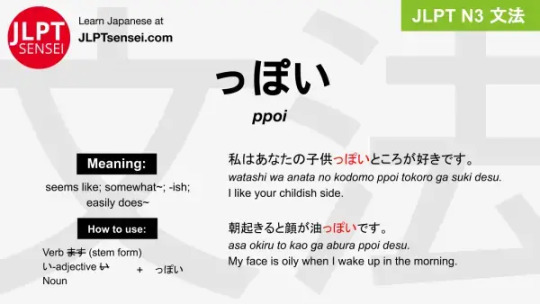
Can be used to say what something is like.
Can be used to say that something appears to be the opposite of what you would expect.
Can be used to describe something that someone is likely to do or often does.
Note:
When following a noun or い-adjective, the meaning is similar to -ish, -like, -ly. The number of adjectives that can be used with this grammar are limited. Usually negative when used after a noun or adjective, but not always.
When following a verb, the meaning is easy to do, often do. This grammar cannot be used with all verbs.
あの小学生は大人っぽい。 あの しょうがくせい は おとなっぽい。 That elementary school student acts like an adult.
油っぽい食事は好きじゃない。 あぶらっぽい しょくじ は すき じゃ ない。 I don't like oily foods.
飽きっぽいから何事も成功しないのだ。 あきっぽい から なにごと も せいこう しない の だ。 You don't succeed in anything because you are quick to lose interest.
年を取ると、忘れっぽくなる。 とし を とる と、わすれっぽく なる。 As one gets older, one tends to become more forgetful.
#日本語#japanese#japanese language#japanese langblr#japanese studyblr#langblr#studyblr#文法#japanese grammar#jlpt n3#jlpt n4#tokidokitokyo#tdtstudy
156 notes
·
View notes
Text
N4 文法: はずがない
はずがない= cannot be (its impossible)
How to use:
verb stays in dictionary form + はずがない
For な-adjective you な before the はずがない, for nouns you add の before.
Examples:
彼はそなことを言うはずがない- he would never say that
そんなはずがない。- That cannot be true
彼女の話は本当のはずがない- her story cannot be true
そな大きな量を全部食べられるはずがない- there's no way you can eat that whole portion
#japanese#language learning#studyblr#日本語#japan#langblr#nihongo#learn japanese#study kanji#learn kanji#japanese grammar#jlpt n4
95 notes
·
View notes
Text

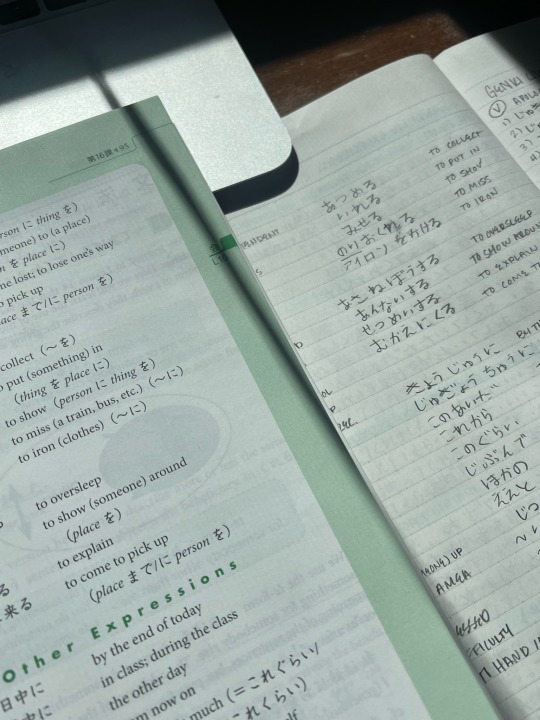
when am i not studying ☕️🏹🏛️
#studyblr#study blog#langblr#langblog#japanese langblr#japanese language#japanese#studyinspo#study motivation#study aesthetic#jlpt n3#jlpt#jlpt n5#jlpt n4#japanese kanji#studystudystudy#exam study#study buddy#study hard#study#study notes#study space#coffee aesthetic#coffee order
91 notes
·
View notes
Text
When I first started teaching English, I totally bought into the idea that my students just needed more speaking practice. After all, they had been studying English since elementary school, so surely the knowledge was already inside of them and they just needed practice to bring it out
This came partially from the way the lessons at my school were set up (a "eikaiwa" in Japan aimed at "teaching" English "conversation"). It also came partially from my own beliefs. I had studied Spanish for years and gotten a 5 on the AP exam and minored in it at university, but I still couldn't speak and surely that was because I didn't have enough opportunities to practice.
But now after becoming fairly proficient in Japanese, I've realized that the reason I couldn't speak Spanish well is...I just never got that good at Spanish. Tests =/= fluency.
Finally admitting that to myself has helped me be a lot more realistic about language learning and grow so much as a teacher.
#langblr#japanese language#english language#spanish language#learning languages#if you feel like you (or your students) understand more than you speak then consider that maybe you aren't understanding as well as u think#when i was like jlpt n4 i used to say i was understanding about 50% of most conversations#now that i'm n2 i feel fairly confident that i'm understanding about 50% of most conversations lol#llu
18 notes
·
View notes
Text
Japanese word of the day
そつぎょう (Hiragana)
卒業 (Kanji)

meaning: graduation/completion (of a course)
pronunciation/romaji: so-tsu-gyou
kanji breakdown: 卒 (sotsu, meaning: graduate); 業 (gyou, meaning: business).
kanji level JPLT N4
bonus/fun thing to know: the kanji letters are the same in Mandarin but pronunciation is different. In mandarin the pronunciation is "biyè"
いっしょに日本語をべんきょうする!がんばってください!
Translation: let's study Japanese together! Let's work hard together!
Romanji: issho ni nihongo o benkyou suru! Gambatte kudasai!
#japanese#learning japanese#japanese vocabulary#japan#hiragana#kanji#katakana#learn japanese#anime#日本#graduation#sotsugyou#japanese word of the day#langblr#langblog#jplt n4#language blog#chinese#posting this because my sister recently graduated hehehe#gintama#shinsengumi
32 notes
·
View notes
Text
Kanji of the day: 会
会 - Meeting, meet, party, association, interview, join
Kun: あ.う、あ.わせる、あつ.まる On: カイ、エ (Pinyin: huì | hui4, kuài | kuai4 )
Pictographic: Believed to have depicted a lidded container with something in it, representing putting something together.

(会 as it appeared in Oracle bone script ~1250-1000 BC.)

(会 as it appeared in Bronze script during the late Western Zhou dynasty, ~800-700 BC.)
Originally this kanji was written as 會, but it eventually got simplified into 会.
Strokes: 6 Radical: 人 human
27 notes
·
View notes
Text
れる・られる Intro to Passive Verb Form
Disclaimer: This is N4 grammar. If you don't know the difference between ru (ichidan) verbs and u (godan) verbs, this post will be too difficult for you! You can read this article first.
If you need help reading kanji, I suggest downloading Yomichan. It helps you decipher texts quickly and easily that would otherwise be too difficult. More info on that here.
So without further ado, let's get into it!
Let's start with Tofugu's description: "The passive suffix 〜られる tells us that a verb is done to someone. It takes the emphasis off of who does the action, and places it on who is affected by the action." (But beware - The Japanese passive is not exactly the same as the English passive. More on that later.)
How to conjugate verbs to passive form:
-iru/-eru-verbs: Replace the last 「る」 with 「られる」
Examples
To eat: 食べる+られる = 食べられるto be eaten
To leave: 出る+られる = 出られる to be left
To close: 閉じる → 閉じられる to be closed
To see: みる → みられる to be seen
u-verbs: Change the last character as you would for negative verbs but attach 「れる」 instead of 「ない」
Examples
To drink: 飲む+ま+れる = 飲まれる to be drunken
To wait: 待つ+た+れる = 持たれる to be waited for
To buy: 買う+わ+れる = 買われる to be bought
To meet: 会う → 会われる to be met
To duplicate: 写す → 写される to be duplicated
To divide: 割る → 割られる to be divided
To write: 書く → 書かれる to be written
To learn: 学ぶ → 学ばれる to be learned
Irregular: To come くる → こられる to have someone come To do する → される to be done
Conjugating れる・られる
れる・られる is an auxiliary verb (cannot be used by itself, must be attached to other verbs), treated as an ichidan verb. Even if a godan verb is in passive form, 〜れる takes the conjugation.
Polite form 〜れる → 〜れます To get pierced 刺(さ)される → 刺されます Plain negative 〜れない To not get pierced 刺されない Plain past 〜れた Was pierced 刺された Plain past negative 〜れなかった Was not pierced 刺されなかった
Forming a Passive Sentence
There are three main parts to a Japanese passive sentence:
An action: the verb of the sentence.
A doer: the person (or thing) that the action is done by.
An experiencer: the person who the action is done to.
Xは Yに 〜られる。
Typical passive sentence: は (or が, or を) indicates the receiver of the action, に (or による) indicates the doer of the action, and then you use the passive verb suffix.
Examples:
私のアイスクリームを兄に食べられた。My ice cream was eaten by my brother. (This sentence instead uses を to mark ice cream as the direct object. In this case the same particle would be used even if the verb wasn’t in potential form → 私のアイスクリームを兄に食べました。→ My brother ate my ice cream.)
新聞がジョンに読まれた。 The newspaper was read by John
私は部屋を綺麗にして、褒められた。I was praised for cleaning my room. (This sentence does not indicate the doer - as in who was doing the praising - hence there being no green).
変な話を親に聞かれた。My strange conversation was overheard by my parents.
私の牛乳を全部誰かに飲まれた。Someone drank all of my milk.
Remember, oftentimes unnecessary elements are omitted. Therefore, the experiencer may be dropped from the sentence (especially when the experiencer is you or their identity is obvious from context). And, just like in english, the doer may also get omitted.
#japanese#learn japanese#japanese studyblr#how to learn japanese#studyblr#learning japanese#hiragana#japanese beginner#japanese langblr#japanese for beginners#intermediate japanese#jlpt n4#n4 grammar#japanese n4#japanese passive form#passive#passive verb#today i learned#study japanese
70 notes
·
View notes
Text
The Difference of それに、それでは、それで、それでも
1. それに = on top of that; in addition...
• このレストランは料理が美味しい。それに、値段も安い。
This restaurant serves delicious food. On top of that, the price is cheap too.
---------------------------------------------------
2. それでは = and so ...; and now...
• それでは、次の議題に移りましょう。
And so, let's move on to the next topic.
---------------------------------------------------
3. それで = so; therefore...
• 昨日は大雨が降った。それで、試合は中止になった。
Yesterday it rained so heavily. Therefore, the game was cancelled.
---------------------------------------------------
4. それでも = even though A, but still wanna do B; Despite..., but he still...
• 雨が降っている。それでも、彼は出かけるつもりだ。
It is raining. But he still intends to go out.
#japanese#jlpt#jlpt n1#jlpt n2#jlpt n3#jlpt n4#jlpt n5#language#learn japanese#nihongo#study blog#studyblr#study tips#study japanese#immersion#foreign languages#language lover#learning languages#learnsomethingneweveryday
228 notes
·
View notes
Text
こんにちは、みなさん。
私の名前はシャロームです。
アジア研究とビジネスを専攻している大学二年生です。日本に留学したいと思っています。
日本語を勉強し始めて二年になりますが、15歳の時に歴史映画を観てからずっと日本語に興味を持っていました。今年の12月に日本語能力試験N4を受ける予定です。
正直、リスニングの部分がちょっと不安です。 本当に大変です。 日本語の会話を聞こうとしても、ほとんどの場合、何を言われているのか全く分かりません。本当にイライラします!
東京には住みたくありません。日本の日常生活を体験したいです。また、できるだけ多く日本語を話す練習もしたいです。
最近、日本の人たちと話す機会を探してみたけど、思ったより難しいです。Tumblrは日本語で日記を書くのにいいかもしれません。
書く練習ができるし、日本の人とつながれるかもしれません。

#jlpt n5#jlpt n4#jlpt#japanese language#japanese studyblr#japanese langblr#日本語#japanese studyspo#日本語の勉強#日本語のブログ#日本語能力試験#日記#ひとりごと#友達
18 notes
·
View notes
Text
The Complete JLPT N4 Grammar Video(Game) Textbook
youtube
16 notes
·
View notes
Text
IDK if this post will reach japanese learning langblr but FYI I'm selling my Dekiru Nihongo - Upper Beginner level book on Vinted 💁🏾♀️📚🎒
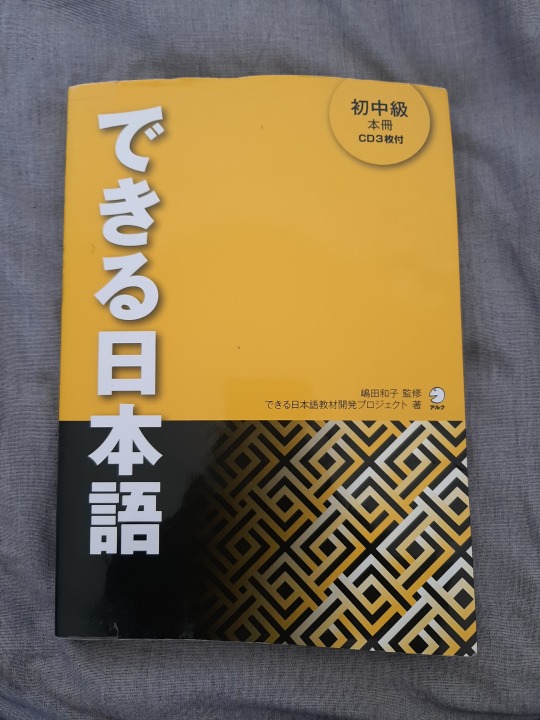

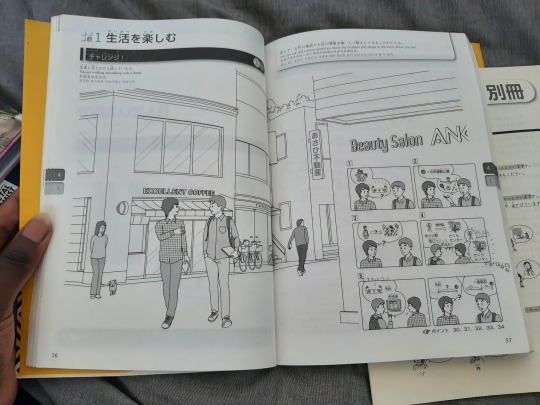
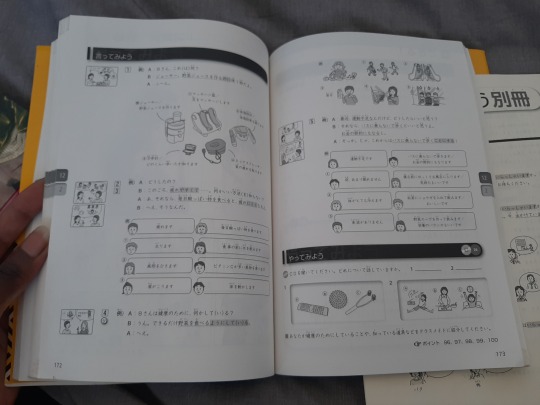
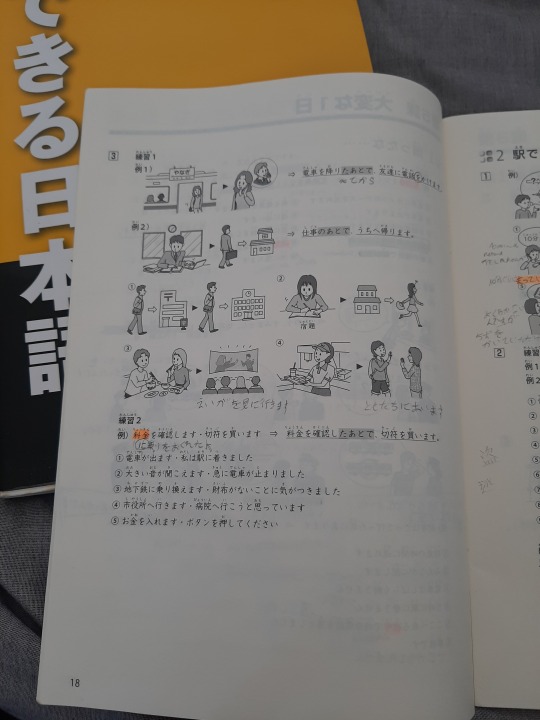
15€ instead of 43,50€ (at least, that's how expensive they are in France)
FYI Vinted allows international shipping, so I can ship it anywhere in the world :)
⚠️ Since I'm moving at the end of the month, this is a LIMITED sale. After August 22 I'll have to give the book away in a local recycling book network so the book won'tbe available for sale anymore
#できる日本語#dekiru nihongo#dekirunihongo#japan#langblr#japanese learning#日本語#studyblr#jlpt 5#jlpt 4#jlpt#jlpt n5#jlpt n4#japanese language#language learning#used book#languages#Vinted#mine#book#book seller
7 notes
·
View notes
Text
N4 文法:出す
出す(だす)= to suddenly begin, to suddenly appear
Verb take off masu + 出す= 笑います- ��い出す= suddenly laugh
彼の話を聞いて、ついに笑い出してしまった。= when I heard his storyi suddenly burst out laughing
雨が急に降り出した =it suddenly started raining
彼は店から飛び出した= he suddenly dashed out the store
#japanese#language learning#studyblr#日本語#japan#langblr#nihongo#learn japanese#study kanji#learn kanji#jlpt n4
25 notes
·
View notes